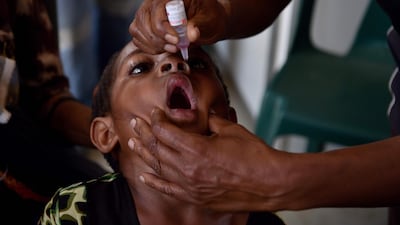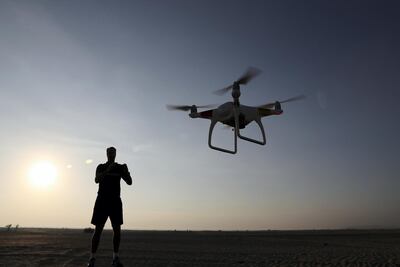New technology is allowing life-saving vaccinations to be delivered to isolated communities - but is also fuelling the spread of anti-immunisation propaganda in the developing world, the head of a charity that has saved millions of lives has said.
Seth Berkley, chief executive of vaccines alliance GAVI, said high-tech drones are now flying vaccinations and other supplies to remote settlements in Rwanda, with the programme set to expand rapidly to other countries.
Meanwhile, other innovations, such as sophisticated solar-powered fridges, are solving problems around how to preserve inoculations on journeys to hard-to-reach areas without a reliable electricity supply.
However, as he prepares to deliver a progress report on his organisation's work to donors in Abu Dhabi this week, he also revealed they are facing new challenges in dealing with “epidemics of disinformation”, spread over sites like WhatsApp and Twitter and fuelled by fake Russian bots and trolls.
The availability of the internet and smartphones, even in poor countries, is making it easier to promote fake news and conspiracy theories claiming vaccinations are dangerous, he said. Many of the theories have echoes of similarly debunked claims, including around a link between the MMR jab and autism, which have previously gained traction in the West.
“In the developing world, people see the reasons to get vaccines,” Dr Berkley said. “What we're seeing though, are questions being raised and there has been a few examples of WhatsApp-type rumours that have spread.
“We are seeing more and more problems with misinformation in developing countries. It is very hard to control and we suspect this is going to grow over time.
"Recently it's gone further - the Russian bots, used to cause confusion in elections, have begun to be used on anti-vaccine slogans. The reason they're doing that is it just creates disruption in society if you have outbreak of disease and a loss of trust. So it really is becoming a big challenge.”
GAVI is attempting to recruit trusted local figures, such as politicians, doctors and other civic leaders, to reassure the public about the safety of vaccinations.
Hundreds of delegates from across the world will gather in Abu Dhabi for the summit, which comes half-way through GAVI’s latest programme, which runs in four year cycles. Set up in 2000 and run through a partnership between the world’s governments, charitable foundations as well as the private sector, it has helped to immunise around 700 million people, saving an estimated 10 million lives. The UAE is a major donor to GAVI.
_______________
Read more:
Sheikh Mohammed donates more than Dh18m towards global vaccine initiative
UAE helps vaccinate 2 million children
_______________
Mr Berkley said the organisation would report it is delivering on its goals in the face of other new challenges, including record numbers of refugees and growing numbers living in urban slums, where diseases can spread “explosively”.
The organisation is pioneering new technology, with health supplies already being delivered to order by drone in Rwanda. There, a journey that could take hours over inhospitable terrain can be completed in 20 minutes. An order is sent by text message to a central distribution hub, were workers will then load a drone with supplies, such as blood or top-up vaccinations.
"If you get bitten by a rabid dog, it's 100 per cent fatal,” Dr Berkley said. “The challenge is [the vaccine, which is effective if administered before symptoms appear] is expensive and you have to make sure it's available.
“So if someone comes into a health clinic in Rwanda and needs a rabies vaccine, they can send a text and 20 minutes later the rabies vaccine is there.
"Or if you're out in a rural area doing a catch up campaign, and you ran out of a specific vaccine, you could have that 20 minutes later. Soon, some other countries are going to be moving forward on that so we'll be seeing it operating in some other areas as well. There's a lot of innovation going on.”

Another example is high-tech fridges, which are helping transport vaccines for longer distances. Most have to be stored at very low temperatures for them to remain effective, which causes challenges in countries with poor infrastructure. A previous solution, using propane to power fridges, “didn’t work so well” Dr Berkley admitted, requiring regular maintenance and refuelling.
The sophisticated solar power fridges, which remain on even in overcast weather, have been developed with Gavi's help. Although expensive, they have a longer lifespan and require less upkeep.
"We're talking about tens of thousands of new fridges that are being distributed across the world,” he said. “About 25 per cent of those are going to places that have not had a cold-chain before, and that's made a tremendous difference. I'll show some data in my presentation of Tuesday of some of the dramatic changes that can occur in a country just by adding a few fridges to a district. Our goal is to get it out to everywhere that needs it.”
While dozens of government officials will be at the event, one absentee will be the Congolese health minister, who cancelled at the last minute to deal with an Ebola outbreak in his country, which is now the second-largest in history.
It has spread to Butembo, a major city in Eastern Congo. Efforts to get an as-yet unlicenced vaccine to the region, which has proved successful in containing previous outbreaks, has been hampered by conflict and instability.


